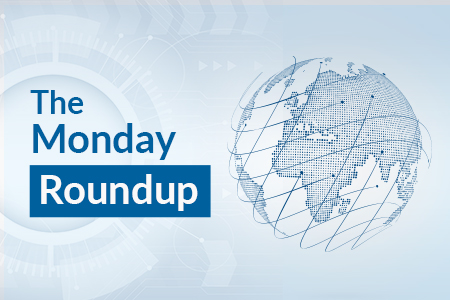 Back
Back
The Monday Roundup: what we are watching this week | April 10th
By Puja Sharma
 The Monday Roundup sets the scene for the week’s biggest news stories, industry deals, and upcoming events. For Prime subscribers only.
The Monday Roundup sets the scene for the week’s biggest news stories, industry deals, and upcoming events. For Prime subscribers only.
Stable outlook
Private investment and wealth management firm Rathbones is to acquire the UK investment and wealth management arm of Investec Group in an all-share deal worth £839 million.
Rathbones will issue shares in the company in exchange for the entire share capital of Investec Wealth and Investment (Investec W&I), creating a UK wealth manager with around £100 billion in funds under management.
The combined company will continue to operate as an independent firm under the Rathbones brand with Investec Group acting as a long-term shareholder. Investec W&I’s standalone branding will be phased out following a transition period, Rathbones says.
On completion of the deal, Investec Group will own 41.25% of the enlarged Rathbones Group, with Investec Group’s voting rights limited to 29.9%.
The outlook on Oman Arab Bank’s (OAB) Long-Term Foreign Currency Rating (LT FCR) and Bank Standalone Rating (BSR) was revised from ‘stable’ to ‘positive’ by Capital Intelligence Ratings (CI Ratings).”
The bank’s LT FCR and BSR are respectively ‘BB’ and ‘bb’, while its Short-Term Foreign Currency Rating (ST FCR) has been affirmed at ‘B’, its Core Financial Strength (CFS) at ‘bbb-’ and its Extraordinary Support Level (ESL) at ‘moderate’. The move follows CI Ratings’ similar revision of Oman’s sovereign ratings outlook to ‘positive’ from ‘stable’.
Sulaiman Al Harthi, CEO at OAB, said: “Reflecting the similarly positive momentum across the Sultanate’s wider economy, we are extremely pleased to share the news of Capital Intelligence Ratings’ revisions for OAB. We see this move as a strong backing for the bank that will inspire further confidence in everything we are striving to achieve.”
He added, “Over the coming year, I share CI Ratings’ views and believe that OAB will continue to go from strength to strength, supported by strong economic growth. It’s a journey on which I am enthused to be steering us all.”
E-wallet era
FinTech-SaaS firm, Zaggle Prepaid Ocean Services has received the final observations from the market regulator SEBI for its proposed initial public offering (IPO). Zaggle is a leading player in spend management with a differentiated value proposition and diversified user base.
Earlier this year the firm attracted a Rs 50 crore ($6 million) investment from Vivriti Asset Management (VAM). “The proceeds from the investment will be utilised in growing Zaggle’s products such as the newly launched accounts payable platform by Zaggle: Zoyer,” the company stated. Zoyer is a data-driven, SaaS-based business management platform with automated finance capabilities.
Last year, The Mumbai-based company’s issue will comprise a fresh issue of ₹490 crore and an offer for sale of up to 10.53 million shares by shareholders, according to the draft prospectus filed by Zaggle with the Securities and Exchange Board of India (Sebi). The equity shares offered under the IPO have a face value of Re 1 each.
Over 58 million active users in the Philippines spend a total of 4.4 million hours using e-wallet applications, according to a new report revealed by the Philippines-based consumer credit service Digido.
Digido analysis of 14 companies operating in the Philippines that have applications inside the iOS App Store and/or Google Play, reveals that these companies have a combined total of 114.4 million unique downloads as of December 2022, representing 20 percent of the total downloads from Business and Finance categories across all devices and all platforms.
From December 2018 to December 2022, the total number of unique downloads among the e-wallets included in the study increased by 632% (+99 million), growing by 30.5% (+26.7 million) in 2022 alone.
Growth is attributed to the following reasons including the population of the Philippines aged 15+, which, according to United Nations estimates, is expected to be at some 85.4 million people by the end of 2025.
What is the buzz
Due to uncertainty in the banking sector, the UK Treasury has put plans to return NatWest to private hands-on hold for two years.
Taking over NatWest Group following the financial crisis of 2008, the UK government currently owns about 42% of the bank. The taxpayers paid £45.5 billion for that bailout. The National Westminster Bank, which is commonly known as NatWest, is one of the largest retail and commercial banks in the United Kingdom.
The government bought its stake in NatWest at 502p per share. Today they are worth around 268p, having fallen 9% in the past month alone. Now, rather than offload a 15% stake in the group in August this year, HM Treasury has pushed this back to August 2025 and will continue to sell shares under the trading plan set up by then chancellor Rishi Sunak in 2021.
According to the HM Treasury, the government will only dispose of its NatWest Group shareholding when it represents value for money to do so and market conditions allow. The government now has an extra two years to sell shares in the group and return it to private ownership. Since August 2021, more than £3.7 billion has been raised.
Economic Secretary to the Treasury Andrew Griffith said, “Today’s extension marks another significant milestone in delivering this – ensuring we achieve best value for the taxpayer as we sell down the shareholding.”
IBSi FinTech Journal

- Most trusted FinTech journal since 1991
- Digital monthly issue
- 60+ pages of research, analysis, interviews, opinions, and rankings
- Global coverage
Other Related News
Related Reports

Sales League Table Report 2025
Know More
Global Digital Banking Vendor & Landscape Report Q2 2025
Know More
NextGen WealthTech: The Trends To Shape The Future Q4 2023
Know More
Intelligent Document Processing in Financial Services Q2 2025
Know More


